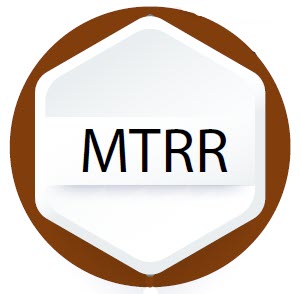
Get tested for MTR/MTRR gene mutation here.
What are MTR/MTRR gene mutations?
MTRR (Methionine synthase reductase) helps recycle B12. The combination of MTR and MTRR mutations can deplete methyl B12. MTR A2756G, MTRR A66G, MTRR H595Y, MTRR K350A, MTRR R415T, MTRR S257T, and MTRR A664A all work together to convert homocysteine to methionine.
MTR (5-methyltetrahydrofolate-homocysteine methyltransferase) provides instructions for making the enzyme methionine synthase. Methionine synthase helps convert the amino acid homocysteine to methionine. To work properly, methionine synthase requires B12 (specifically in the form of methylcobalamin). An MTR A2756G mutation increases the activity of the MTR gene causing a greater need for B12 since the enzyme causes B12 to deplete since it is using it up at a faster rate. Mutations in MTR have been identified as the underlying cause of methylcobalamin
deficiency. Megaloblastic anemia can occur as a consequence of reduce methionine synthase activity.
A homozygous mutation of MTR A2756G is not very common (<1% of CEU population). Some studies have demonstrated that people with a combination of MTHFR C677T and MTR A2756G have persistently high homocysteine levels unless they are treated with both B12 and folate.
Low methionine can result from MTR/MTRR mutations. High methionine with low homocysteine can result from a MTR deficiency. B12 levels less than 600 can result from MTR/MTRR mutation.
MTR/MTRR problems / Symptoms
- Homocysteine imbalances
- Methionine deficiency
Methionine deficiency signs – fat accumulation, fatty liver, lowered glutathione production, build up of toxins, cardiovascular problems, rasied inflammatory histamine, poor memory, lowered immunity, UTI, reduced SAMe production.
Vitamin B12 deficiency signs – Poor hair condition, eczema or dermatitis, mouth oversensitive to heat or cold, irritability, anxiety or tension, lack of energy, constipation, tender or sore muscles, pale skin, megaloblastic macrocytic anemia, decrease in DNA synthesis, heart disease, skin pallor, fatigue, shortness of breath, and palpitations. Neurologic problems, which may be irreparable, are manifested by numbness in extremities, abnormal gait, increased loss of coordination, loss of a sense of relative position (proprioreception), loss of vibration sense or touch in the ankles and toes, swelling of myelinated fibers, and demyelination, along with irritability, memory loss, disorientation, psychosis, and dementia, low blood leukocyte and thrombocyte counts. Pernicious (which refers to death) anemia.
MTR/MTRR Methylation & Methionine / Homocysteine Pathways
- MTR A*153G
- A2756G
- MTR A50417C
- MTR A68550G
- A92580G
- MTR C62048T
- MTR G106853T
- G34783A
- MTR G35489C
- MTR G74984T
- G94982A
- MTR G95096T
- MTRR -11 A664A
- A22893G
- MTRR A66G
- C1078G
- MTRR C32295T
- MTRR C524T
- G*541A
- MTRR G1155A
- MTRR G12099A
- G15734A
- MTRR K350A
- MTRR T*662A
- T12072C
- MTRR T16071C
Mitochondrial Function
- MTRR -11 A664A
- A22893G
- MTRR A66G
- C1078G
- MTRR C32295T
- MTRR C524T
- G*541A
- MTRR G1155A
- MTRR G12099A
- G15734A
- MTRR K350A
- MTRR T*662a
- T12072C
- MTRR T16071C
Looking for MTR/MTRR gene mutation treatments, contact us here.

